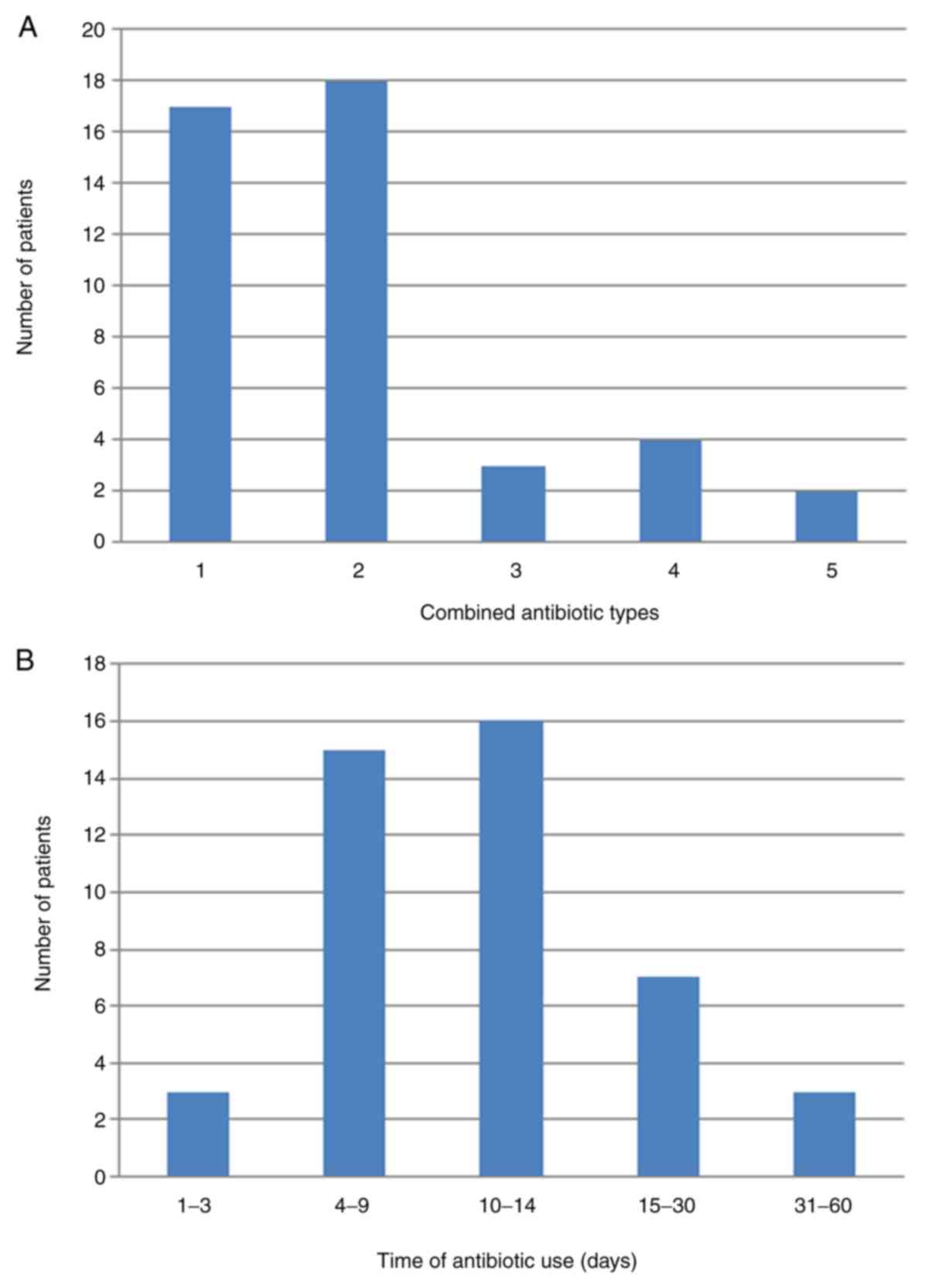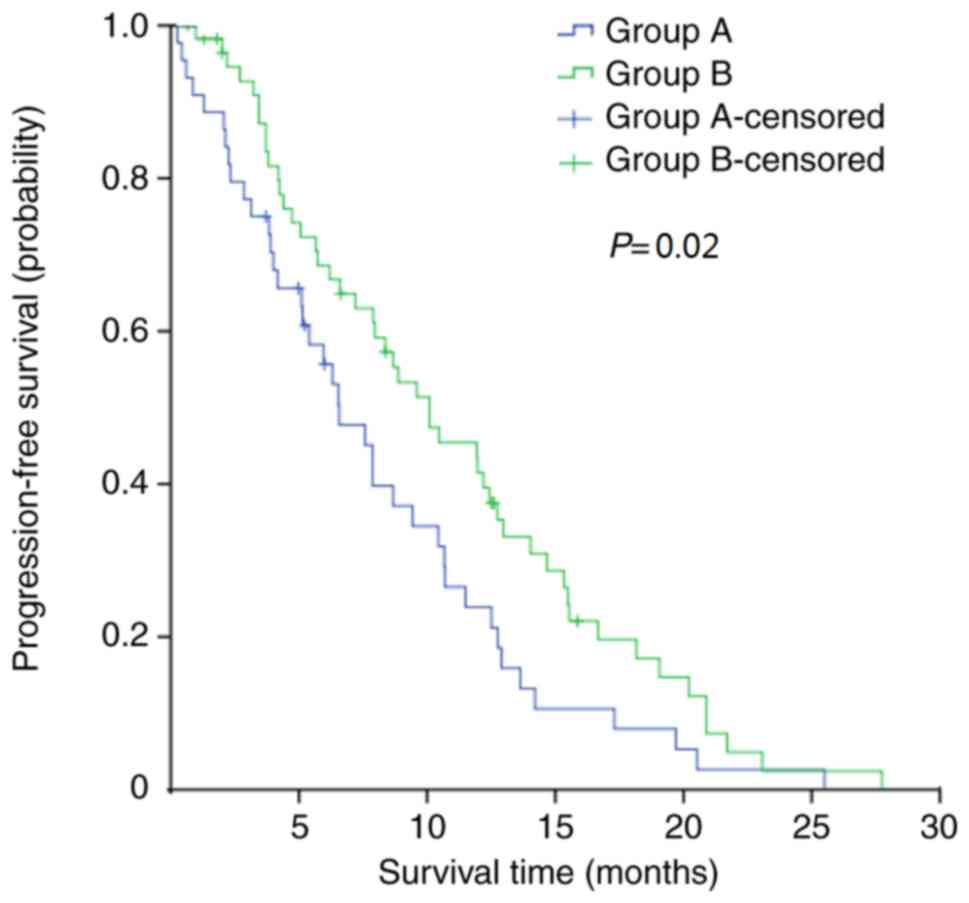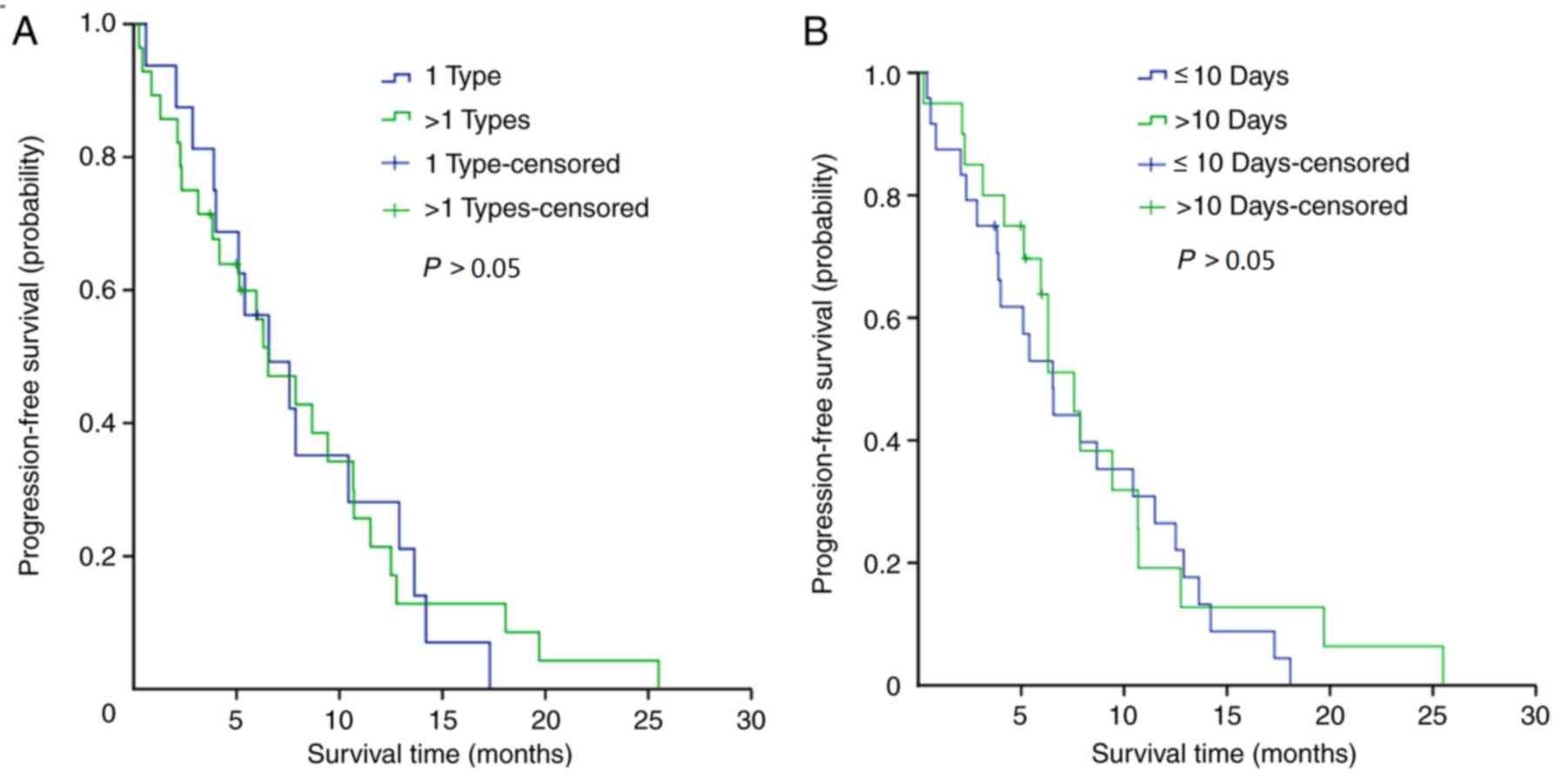|
1
|
Siegel RL, Miller KD and Jemal A: Cancer
statistics, 2017. CA Cancer J Clin. 67:7–30. 2017. View Article : Google Scholar : PubMed/NCBI
|
|
2
|
Visbal AL, Leighl NB, Feld R and Shepherd
FA: Adjuvant chemotherapy for early-stage non-small cell lung
cancer. Chest. 128:2933–2943. 2005. View Article : Google Scholar : PubMed/NCBI
|
|
3
|
Chen F, Cole P and Bina WF: Time trend and
geographic patterns of lung adenocarcinoma in the United States,
1973–2002. Cancer Epidemiol Biomarkers Prev. 16:2724–2729. 2007.
View Article : Google Scholar : PubMed/NCBI
|
|
4
|
Zatloukal P, Petruzelka L, Zemanova M,
Kolek V, Skricková J, Pesek M, Fojtů H, Grygárková I, Sixtová D,
Roubec J, et al: Gemcitabine plus cisplatin vs. gemcitabine plus
carboplatin in stage IIIb and IV non-small cell lung cancer: A
phase III randomized trial. Lung Cancer. 41:321–331. 2003.
View Article : Google Scholar : PubMed/NCBI
|
|
5
|
Mok TS, Wu YL, Thongprasert S, Yang CH,
Chu DT, Saijo N, Sunpaweravong P, Han B, Margono B, Ichinose Y, et
al: Gefitinib or carboplatin-paclitaxel in pulmonary
adenocarcinoma. N Engl J Med. 361:947–957. 2009. View Article : Google Scholar : PubMed/NCBI
|
|
6
|
Kris MG, Natale RB, Herbst RS, Lynch TJ
Jr, Prager D, Belani CP, Schiller JH, Kelly K, Spiridonidis H,
Sandler A, et al: Efficacy of gefitinib, an inhibitor of the
epidermal growth factor receptor tyrosine kinase, in symptomatic
patients with non-small cell lung cancer: A randomized trial. JAMA.
290:2149–2158. 2003. View Article : Google Scholar : PubMed/NCBI
|
|
7
|
Perez-Soler R, Chachoua A, Hammond LA,
Rowinsky EK, Huberman M, Karp D, Rigas J, Clark GM, Santabárbara P
and Bonomi P: Determinants of tumor response and survival with
erlotinib in patients with non-small-cell lung cancer. J Clin
Oncol. 22:3238–3247. 2004. View Article : Google Scholar : PubMed/NCBI
|
|
8
|
Gomes M, Teixeira AL, Coelho A, Araújo A
and Medeiros R: The role of inflammation in lung cancer. Adv Exp
Med Biol. 816:1–23. 2014. View Article : Google Scholar : PubMed/NCBI
|
|
9
|
Shiels MS, Pfeiffer RM, Hildesheim A,
Engels EA, Kemp TJ, Park JH, Katki HA, Koshiol J, Shelton G,
Caporaso NE, et al: Circulating inflammation markers and
prospective risk for lung cancer. J Natl Cancer Inst.
105:1871–1880. 2013. View Article : Google Scholar : PubMed/NCBI
|
|
10
|
Hsu-Kim C, Hoag JB, Cheng GS and Lund ME:
The microbiology of postobstructive pneumonia in lung cancer
patients. J Bronchology Interv Pulmonol. 20:266–270. 2013.
View Article : Google Scholar : PubMed/NCBI
|
|
11
|
Huemer F, Rinnerthaler G, Westphal T,
Hackl H, Hutarew G, Gampenrieder SP, Weiss L and Greil R: Impact of
antibiotic treatment on immune-checkpoint blockade efficacy in
advanced non-squamous non-small cell lung cancer. Oncotarget.
9:16512–16520. 2018. View Article : Google Scholar : PubMed/NCBI
|
|
12
|
van Vliet MJ, Harmsen HJ, de Bont ES and
Tissing WJ: The role of intestinal microbiota in the development
and severity of chemotherapy-induced mucositis. PLoS Pathog.
6:e10008792010. View Article : Google Scholar : PubMed/NCBI
|
|
13
|
Marin M, Gudiol C, Ardanuy C, Garcia-Vidal
C, Calvo M, Arnan M and Carratalà J: Bloodstream infections in
neutropenic patients with cancer: Differences between patients with
haematological malignancies and solid tumours. J Infect.
69:417–423. 2014. View Article : Google Scholar : PubMed/NCBI
|
|
14
|
Shi YK, Wang L, Han BH, Li W, Yu P, Liu
YP, Ding CM, Song X, Ma ZY, Ren XL, et al: First-line icotinib
versus cisplatin/pemetrexed plus pemetrexed maintenance therapy for
patients with advanced EGFR mutation-positive lung adenocarcinoma
(CONVINCE): A phase 3, open-label, randomized study. Ann Oncol.
28:2443–2450. 2017. View Article : Google Scholar : PubMed/NCBI
|
|
15
|
Wu YL, Zhou C, Hu CP, Feng J, Lu S, Huang
Y, Li W, Hou M, Shi JH, Lee KY, et al: Afatinib versus cisplatin
plus gemcitabine for first-line treatment of Asian patients with
advanced non-small-cell lung cancer harbouring EGFR mutations
(LUX-Lung 6): An open-label, randomised phase 3 trial. Lancet
Oncol. 15:213–222. 2014. View Article : Google Scholar : PubMed/NCBI
|
|
16
|
Broderick JM, Hussey J, Kennedy MJ and
O'Donnell DM: Patients over 65 years are assigned lower ECOG PS
scores than younger patients, although objectively measured
physical activity is no different. J Geriatr Oncol. 5:49–56. 2014.
View Article : Google Scholar : PubMed/NCBI
|
|
17
|
Zhang S, Liang F and Tannock I: Use and
misuse of common terminology criteria for adverse events in cancer
clinical trials. BMC Cancer. 16:3922016. View Article : Google Scholar : PubMed/NCBI
|
|
18
|
Beck TF, Mullikin JC; NISC Comparative
Sequencing Program, ; Biesecker LG: Systematic evaluation of sanger
validation of next-generation sequencing variants. Clin Chem.
62:647–654. 2016. View Article : Google Scholar : PubMed/NCBI
|
|
19
|
Timmer-Bonte JN, de Boo TM, Smit HJ,
Biesma B, Wilschut FA, Cheragwandi SA, Termeer A, Hensing CA,
Akkermans J, Adang EM, et al: Prevention of chemotherapy-induced
febrile neutropenia by prophylactic antibiotics plus or minus
granulocyte colony-stimulating factor in small-cell lung cancer: A
Dutch Randomized Phase III Study. J Clin Oncol. 23:7974–7984. 2005.
View Article : Google Scholar : PubMed/NCBI
|
|
20
|
Le Bastard Q, Ward T, Sidiropoulos D,
Hillmann BM, Chun CL, Sadowsky MJ, Knights D and Montassier E:
Fecal microbiota transplantation reverses antibiotic and
chemotherapy-induced gut dysbiosis in mice. Sci Rep. 8:62192018.
View Article : Google Scholar : PubMed/NCBI
|
|
21
|
Routy B, Le Chatelier E, Derosa L, Duong
CPM, Alou MT, Daillère R, Fluckiger A, Messaoudene M, Rauber C,
Roberti MP, et al: Gut microbiome influences efficacy of PD-1-based
immunotherapy against epithelial tumors. Science. 359:91–97. 2018.
View Article : Google Scholar : PubMed/NCBI
|
|
22
|
Zaura E, Brandt BW, Teixeira de Mattos MJ,
Buijs MJ, Caspers MP, Rashid MU, Weintraub A, Nord CE, Savell A, Hu
Y, et al: Same exposure but two radically different responses to
antibiotics: Resilience of the salivarymicrobiome versus long-term
microbial shifts in feces. MBio. 6:e01693–e01615. 2015. View Article : Google Scholar : PubMed/NCBI
|
|
23
|
Clemente JC, Ursell LK, Parfrey LW and
Knight R: The impact of the gut microbiota on human health: An
integrative view. Cell. 148:1258–1270. 2012. View Article : Google Scholar : PubMed/NCBI
|
|
24
|
Modi SR, Collins JJ and Relman DA:
Antibiotics and the gut microbiota. J Clin Invest. 124:4212–4218.
2014. View
Article : Google Scholar : PubMed/NCBI
|
|
25
|
Roberts SE, Wotton CJ, Williams JG,
Griffith M and Goldacre MJ: Perinatal and early life risk factors
for inflammatory bowel disease. World J Gastroenterol. 17:743–749.
2011. View Article : Google Scholar : PubMed/NCBI
|
|
26
|
Willing BP, Russell SL and Finlay BB:
Shifting the balance: Antibiotic effects on host-microbiota
mutualism. Nat Rev Microbiol. 9:233–243. 2011. View Article : Google Scholar : PubMed/NCBI
|

















